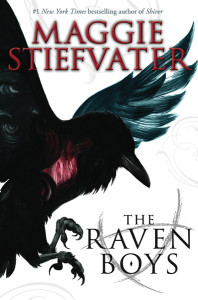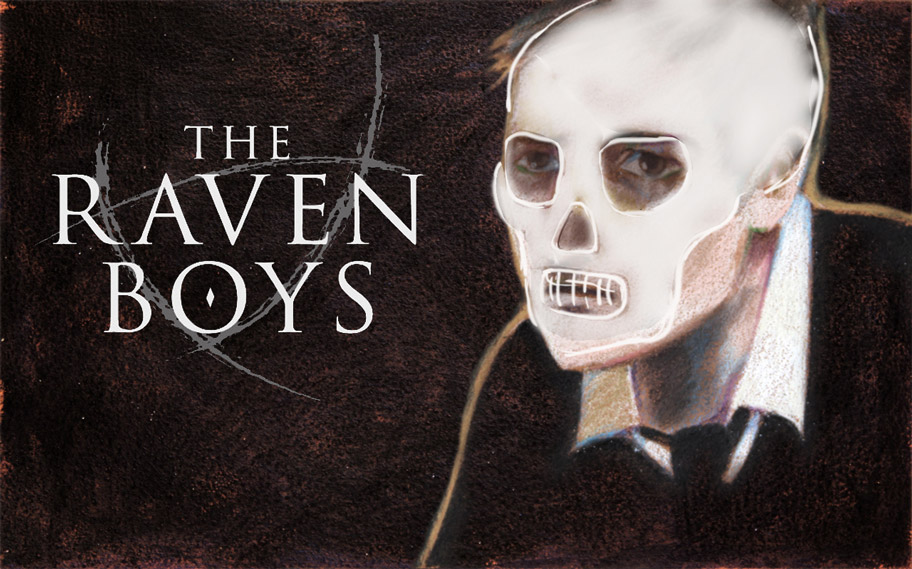
Set in Henrietta, Virginia, Maggie Stiefvater’s The Raven Boys exhibits characteristics of the “southern novel”, a form I associate strongly with Tom Wolfe or Harper Lee. Novels of the American South tend to focus on the gross inequalities that exist there, often couched in racial terms, but also the nature of inherited wealth juxtaposed with the lack of opportunity that exists in the more urban centers. In the case of The Raven Boys, Stiefvater creates that paradigm between Blue Sargent, daughter to a poor, but comfortable, and exceedingly proficient psychic, and four boys from Aglionby, a feeder high school for the Ivy League.
The Raven Boys is an examination of the power dynamics between people.
For all her life, Blue has been warned that Aglionby boys are trouble. They’re rich and live by a code that means the rules don’t apply to them. These Aglionby boys–Gansey, Adam, Ronan, and Noah–would be no different, except they can’t accept the lives they’ve been given. They want something more, for themselves and for each other. Bound up in a brotherhood dedicated to uncovering a measure of magic in the world, the boys come to Blue and her family for help. While the story is a quest, the novel is hardly about it at all. Not just about the unequal nature of the American South, The Raven Boys is an examination of the power dynamics between people. The power we give to others over us, and the power we reserve for ourselves. In other words, it’s a novel of character and the connections that bind them together.
Gansey has everything—family money, good looks, and devoted (dependent?) friends. Adam is a scholarship student who refuses to be taken in by his friends’ resources. Ronan wants nothing, but to be left alone, to wallow in grief and throw away his life. And Noah just watches.
They filled the hallway to overflowing, somehow, the three of them, loud and male and so comfortable with one another that they allowed no one else to be comfortable with them.
For anyone who’s existed in the male pack dynamic that Stiefvater’s characters inhabit, that passage hits home like few will. Not only is it insightful, but cutting in its application. Written from Blue’s point of view, the observation is a judgement of Gansey, Adam, and Ronan’s ability to interact with the world around them. Namely, that interacting with anyone but each other is impossible without the others. Much like Wolfe’s novels, Stiefvater seems fascinated with how the boys organize themselves. How they relate to themselves, to women, to peers, and to adults, and how they in turn are treated.

Many would characterize the novel as a romance, it’s an inexact and ultimately degrading term when used in the context of The Raven Boys. Blue, worried about an old family prediction that heralds the death of her true love should she kiss him, doesn’t seek love out. Nor, to be frank, does she find it. Instead, I see a powerful discussion on the male pack dynamic and the dance between them as Blue is introduced to their midst. Is this a male reader enforcing a reading on the text the author isn’t nearly as fascinated with as I am? Probably. But, it’s what I took away from it, beneath prose and plot, the former gorgeous in its simplicity and the latter compelling even as it’s unnecessary. It’s why reviews like this make me angry, where the word romance is used as a pejorative not a descriptor. The Raven Boys is a book for everyone, with depth to illicit a different emotional response from everyone who reads it.
Oddly, one book above all others came to mind as I read The Raven Boys — Mark Lawrence’s Prince of Thorns (REVIEW). Surprised? I was too. The novels have nothing in common except a rare ability to evoke that aforementioned emotion and to crush the reader with the simplest language.
When Gansey was polite, it made him powerful. When Adam was polite, he was giving power away.
In seventeen words, Stiefvater conveys almost everything someone needs to know about Gansey and Adam and the relationships that exists between them. This economy of language is prevalent throughout and combined with metaphors that illuminate more than an explicit paragraph could ever.
Gansey had once told Adam that he was afraid most people didn’t know how to handle Ronan. What he meant by this was that he was worried that one day someone would fall on Ronan and cut themselves.
He always said Ronan differently from other words. As if he meant to say another word entirely – something like knife or poison or revenge – and then swapped it out for Ronan’s name at the last moment.
One of the finest novels I’ve read this decade, one that eschews genre classification or reading category. I cannot recommend it enough.
Admittedly, the novel concludes in strange fashion. What was a pensive coiled spring is unleashed all too quickly, introducing concepts that seem to lack the layering required for the reader to appreciate them fully. The final line, which should drive excitement for the sequel, Dream Thieves, seems a non-sequitur in revealing a facet to a character that has not even been hinted at. None of that matters though. Raven Boys doesn’t care that much about its story, not really. Maggie Stiefvater has written an exploration of character, which for my money is by far the most riveting notion an author can explore. The result is one of the finest novels I’ve read this decade, one that eschews genre classification or reading category. I cannot recommend it enough.


*SPARKLES ALL OVER THE COMMENTS*
Yeah, I’ve really got to read this…
“The novels have nothing in common” — I beg to differ!
Line one of Prince of Thorns: “Ravens! Always the ravens.”
Now tell me that The Raven Boys makes no mention of ravens! Case rested.
Fantastic review, and I hope you’re reading Dream Thieves soon. It’s in reading that novel that it becomes clear there are actually hints throughout the first book at that final line and more. Arguably the mystery should have perhaps been clearer, but as you also suggest, it’s a fairly minor flaw in a series rich with class and male dynamics and struggles.